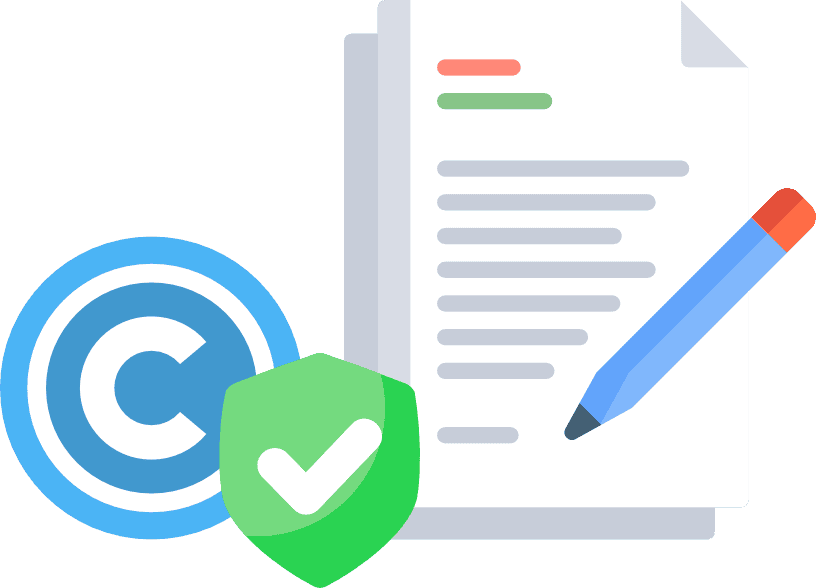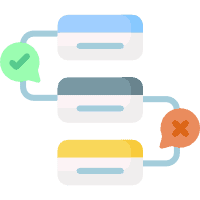Free DMCA Policy Generator
Create a DMCA policy personalized to your needs in minutes. Protect yourself and your business from copyright infringement claims and expensive lawsuits.
GET STARTED

Generate DMCA Policy in 3 Easy Steps

1. Tell Us About Your Business
Answer a few questions in our smart DMCA policy generator to describe your business and how you operate.

Customize policy
Personalize the policy by changing its look and feel or adding custom clauses to ensure a perfect fit for your business.

3. Download & Publish
Download the completed DMCA policy or publish it on your website or app using one of the several available options.
Trusted by 200,000+ Businesses
Peace of Mind Protection
Protect yourself and your business from frivolous copyright infringement claims and expensive lawsuits.
Win Your Customers’ Trust
Show commitment to transparency and compliance to win your customers’ trust in you and your business.
Focus on Your Business
Do the work that drives you and grow your business while we take care of the ever-changing laws for you.
Everything You Need in One Place
Personalized to Your Needs
Our smart DMCA policy generator will ensure your documents are tailored to your specific needs to fit exactly what you do and how you operate.
No Legal Jargon Guesswork
Save hours of research and take the guesswork out of the legal jargon. Have your DMCA policy ready in minutes with the easy step-by-step process.
Backed by Legal Experts
All policies are curated by a team of legal industry experts to maintain compliance and ongoing protection, and give you peace of mind.
Automatic Updates
We will automatically update your DMCA policy to meet the latest laws, regulations, and requirements as they evolve over time.
Save on Legal Fees
Create your DMCA policy for free or take advantage of additional coverage and tools at a fraction of the cost of hiring a lawyer.
Easy to Install
No technical knowledge is required to create and add the policies to your site or app with multiple installation methods available.
Hear it From Our Customers
“WebsitePolicies made my life so much easier. Thanks to their smart solution, I was able to launch my new online service page within a few hours. It saved me hours and hours of research and work.”

“Exceptional service from WebsitePolicies. They make it so easy. They have comprehensive packages for any type of web-based business and I have peace of mind that the legal side is covered.”

“WebsitePolicies made it super easy to create a disclaimer for our site. We provide coaching and touch on a lot of subjects that can be sensitive and delicate. Having the legal side covered makes me feel at ease.”

Frequently Asked Questions
Yes, having a DMCA policy is beneficial to protect your website or app from copyright infringement claims. This policy also helps in handling any potential copyright issues that may arise.
Without a valid DMCA policy, your website or app may not qualify for DMCA’s safe harbor protections, exposing you to copyright infringement lawsuits and potential monetary damages. It can also result in loss of your website or app, harm your reputation, and even lead to criminal penalties.
Most people complete the online questionnaire in less than 10 minutes. Once finished, our system will automatically generate a detailed DMCA policy for you based on your answers, which will be accessible in your account right away.
Yes, you can re-run the questionnaire and customize your DMCA policy if you’d like to change something to suit your needs better. You can also change the appearance of the DMCA policy if you’d like to embed it on your website or app to match your own theme.
Yes, you can add specific clauses to your DMCA policy if you’d like to address any additional requirements that are relevant to your business model or how you operate.
Your DMCA policy will be available in 25+ languages, including Bulgarian, Croatian, Czech, Danish, Dutch, English, Estonian, Finnish, French, German, Greek, Hungarian, Irish, Italian, Latvian, Lithuanian, Luxembourgish, Polish, Portuguese, Romanian, Russian, Slovak, Slovenian, Spanish, Swedish, and Turkish.
Yes, you can download or copy your DMCA policy once it’s generated. We provide several different formats of the policy text so you can choose whatever works best for you.
Yes, we will host your DMCA policy for you so you can link to it from your website, mobile app, Facebook page, or anywhere else.
Our team of data privacy specialists are constantly tracking changes in copyright and intellectual property laws, adjusting the DMCA policy generator and corresponding documents as needed. The rate of these updates is based on regulatory changes and the ever-changing legal environment.
Yes, our DMCA policy generator is free. Sign up to create and add a DMCA policy to your website in minutes. We also provide cost-effective pricing options that come with extra features to ensure your complete legal coverage and guarantee your peace of mind.
Ready to Get Started?
Create your personalized DMCA policy in minutes. No credit card required.
GET STARTED